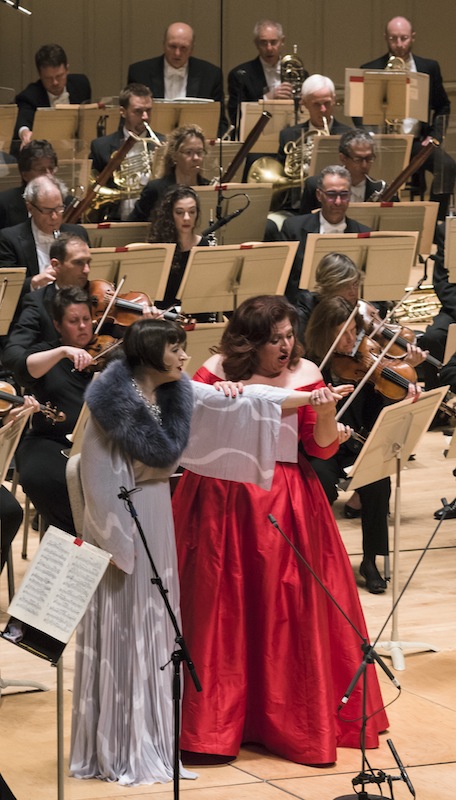Goerke, Barkmin heat up Strauss’s “Elektra” with Nelsons, BSO

Christine Goerke (right) and Gun-Brit Barkmin in Strauss’s “Elektra,” performed with Andris Nelsons and the BSO Thursday night. Photo: Liza Voll
“We were a set of madwomen,” recalled contralto Ernestine Schumann-Heink, who sang the role of Klytämnestra in the 1909 premiere of Elektra. Madness of all sorts—bloody obsession, delusion, stark terror—seemed to wash over the stage of Symphony Hall Thursday night as the Boston Symphony Orchestra with soloists and chorus, under the attentive direction of Andris Nelsons, gave an all-stops-out performance of Strauss’s most extravagant opera.
The entire opera—nearly two hours of it, in one act without a break—seems like an emanation from the fevered mind of its title character, who is onstage nearly throughout. In that most central of opera roles, soprano Christine Goerke carried the show and then some, enacting the wronged princess’s volcanic rage with bold physical presence and a rich, room-filling voice that could soar over Strauss’ massive orchestra in full cry.
Cannily conserving her vocal resources for her long, taxing role, Goerke sang with unrelenting intensity, yet always seemed to have power in reserve even at the drama’s most shattering climaxes.
To call this concert performance semi-staged would be an exaggeration, but at least the singers performed from memory and were provided a small space between the conductor’s podium and the first row of the orchestra, where Elektra could pace like a caged animal and confront the other characters one by one. After a time, one even forgot that there was a man standing on a box waving a baton in the middle of the action.
As Elektra’s timorous sister Chrysothemis, soprano Gun-Brit Barkmin may have overdone the hunching and trembling somewhat, but, with voice slimmed down and slender body seemingly waving in the breeze, she was the personification of a frail reed to hang a murder plot on.
However, when the sisters’ dream of revenge for the murder of their father at last came true, and Barkmin dialed up to full voice to announce the news, the effect was stunning.
As the guilt-ridden mother and queen Klytämnestra recounting her violent dreams, mezzo-soprano Jane Henschel whooped and growled her way through some of the most dissonant, unnerving music in the opera. Though vocally striking, Henschel’s steady performance didn’t quite have the all-out quality of the other “madwomen” on stage.
And this is definitely an opera about women, where the male characters are mainly pawns on the board. Baritone James Rutherford seemed all too aware of that during his somewhat diffident rendering of the role of Orest, brother of the two sisters and seemingly reluctant tool of their revenge. It was a defensible interpretation, but it did let some of the air out of the famous “recognition scene,” in which Elektra sees through her brother’s disguise and is ecstatically reunited with him; on Thursday, soprano Goerke had to do most of the emotional heavy lifting there.
Tenor Gerhard Siegel, on the other hand, was the very picture of self-satisfied arrogance as the queen’s lover Aegisth, piercing of voice and spitting out the kind of German diction you could hang your coat on. It was a pity Strauss and librettist Hofmannsthal didn’t give him much more to do than speak rudely to his valet and get murdered.
There is a brief role for chorus at the end, as the household staff rejoices at the demise of the murderous queen and her lover. Guest chorus conductor James Bagwell led members of the Tanglewood Festival Chorus in the second balcony, to good effect.
But the roles in this work that are collectively most like the traditional Greek chorus are those of the five Maids and their Overseer, who set the scene at the beginning and return to describe offstage action. The First through Fifth Maids—respectively, mezzo-soprano Nadezhda Serdyuk, contralto Claudia Huckle, mezzo-soprano Mary Phillips, soprano Sandra López, and soprano Rebecca Nash—and soprano Nadine Secunde as the Overseer all brought plenty of vocal power and dramatic flair to their narrative of a royal court in disarray.
Sopranos Elizabeth Byrne and Meredith Hansen were a strong supporting presence as the queen’s confidante and trainbearer respectively. Tenor Mark Schowalter and bass Kevin Langan ably represented the male household staff roles.
As the Man Who Wasn’t There, conductor Nelsons toned down his gesticulations for the most part, acknowledging that the orchestra isn’t the star of the opera. Nevertheless, through his efforts, Strauss’s atmospheric effects, mood-painting, and emotional moments from tiny shudders to blinding flashes were superbly realized, and the one-hour-fifty-minute performance seemed to rivet the audience’s attention from the opening orchestral cry to the final fortissimo wallop and standing ovation.
Elektra will be repeated 8 p.m. Saturday. bso.org; 617-266-1200.
Posted in Performances
Posted Oct 19, 2015 at 9:10 am by Ken Rowland
Bravo David Wright!…for a fine non-nonsense review, and focusing on the singers’ performances-every one of them! Refreshing and insightful!
KR